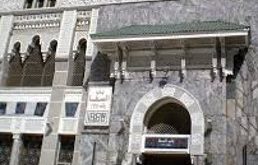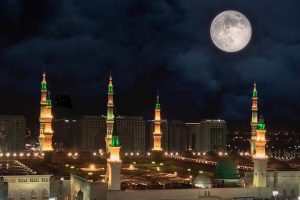On the eve of the birth of Nabi (Sallallahu Alaihi Wasallam), an earthquake shook the palace of Kisra, the Persian King, causing fourteen towers of the palace to collapse. The fire in the temple of Persia, which had been burning continuously for a thousand years was suddenly extinguished and Lake Saawah unexpectedly dried up.
The Persian king Kisra was extremely distressed but royal pride would not allow him to expose his fears. Eventually he summoned his advisors, courtiers and ministers of state and intended convening a meeting to discuss the causes for the unusual events and rare phenomena. Amidst the discussions, news of the fire in the temple reached the court and which only intensified Kisra’s apprehension and increased his anxiety. It was just then that the Mubidhan (the Persian supreme judge) stood up and revealed to the assembly his peculiar vision, which he was shown the previous night. He exclaimed, “Last night I saw a dream wherein I was shown a herd of strong, powerful camels. I saw them travel with great speed dragging along with them Arabian horses until they crossed over the Tigris River and spread throughout the world.” Kisra enquired from the Mubidhan as to what was the interpretation of the dream. The Mubidhan replied, “It is likely that a matter of great significance is about to occur in Arabia. In order to allay your fears I advise you to send a message to your governor in Hiyra asking him to despatch a learned scholar of Arab decent in order to investigate the matter further.” He further remarked that the Arab scholars possess a great deal of knowledge with regard to the current events.
Kisra accepted his advice and sent a message to Nu’man ibn Mundhir, instructing him to despatch an eminent scholar who would be able to adequately answer his questions. Nu’man bin Mundhir immediately sent a prominent and knowledgeable scholar by the name of Abdul Maseeh Ghassaani to Kisra. When Abdul Maseeh arrived in the court of Kisra, Kisra said to him: “Do you possess sufficient knowledge in order to be able to answer all that I wish to ask you?” Abdul Maseeh replied: “Put forward your questions and if I possess the knowledge I will answer you and if I do not possess the knowledge I will guide you to someone more knowledgeable than myself.” Kisra then related all the events that surprisingly occurred in the span of one night. Abdul Maseeh thought for a while and not having the answers to the queries of Kisra felt it best to refer this matter to his uncle ‘Sateeh’. So he said to the king, Kisra, “Perhaps my uncle Sateeh has knowledge of the answers to your questions.”
Sateeh was amongst the most learned men of that time who lived in the famous city of Jaabiyah, in the upper portion of Syria. Kisra, without any delay, commissioned Abdul Maseeh to personally go to his uncle and return with his view on the matter. Abdul Maseeh immediately set out for Shaam (Syria) and reaching Jaabiyah, he found his uncle, Sateeh, in the throes of death. However, being conscious of his surroundings Abdul Maseeh greeted him while reciting poetry. When Sateeh heard him reciting the couplets he turned towards him and said: “Abdul Maseeh, mounted on a speedy camel hastens to Sateeh, as death approaches him. The king of Bani Saasaan (Kisra) has commissioned you to enquire about the earthquake that shook the palace causing fourteen towers to collapse, the sacred fire that has blown out, and the dream of the Mubidhan, in which powerfully built camels were dragging Arabian horses across the Tigris, and thereafter spread throughout the world. O Abdul Maseeh! Listen attentively! When the divine speech (i.e. the word of Allah Ta’aala, the Qur’aan) is recited in abundance, and when the personality carrying the staff appears and when the valley of Samawa begins to flow with water and Lake Saawah dries up, and when the Persian fire becomes extinguished, then Syria will no longer remain Syria for Sateeh. For only a few more years a counted number of men and women from the Sassanidae dynasty (fourteen in number conforming to the total number of pillars that collapsed) will rule and what is to come is as good as here.” With these words Sateeh breathed his last.
Abdul Maseeh returned to Kisra and fully apprised him of all that had transpired. Kisra assumed that time was on his side and said: “The elapse of fourteen kingdoms takes a long time.” But little did he know that time was running out and in a short span of four years ten kingdoms passed. The reign of the remaining four leaders ended with the Khilaafat of Hadhrat Uthmaan (Radiallahu Anhu).
Note: The words “the personality carrying the staff”, was with reference to Rasulullah (Sallallahu Alaihi Wasallam). As it is known that Rasulullah (Salallahu Alaihi Wasallam) would walk with a staff and use it as a sutrah (barrier) during Salaah when out on a journey.
“The personality carrying the staff” appears in Kisra’s dream
Allamah Tabri (Rahmatullahi Alaihi) has written that the Persian king, Abrawez ibn Hurmuz had once seen a dream wherein he was ordered to hand over whatever was in his hand to the person standing before him holding a staff. The King was extremely pertubed by this dream as the dream implied that he will lose his power and kingdom. It was not long thereafter that his governor, Nu’man ibn Mundhir, informed him that the final prophet has appeared in Makkah. It was then that the king was convinced that his kingdom would soon be conquered by the final prophet.[1]
[1]al-Bidaayah wan-Nihaayah 2/249 (dar al-Kutub al-‘Ihmiyyah), as-Seerah al-Halabiyyah 1/73 (dar Ihyaa at-Turaath al-‘Arabiy)
 Ihyaaud Deen An Effort to Revive Deen in Totality
Ihyaaud Deen An Effort to Revive Deen in Totality


